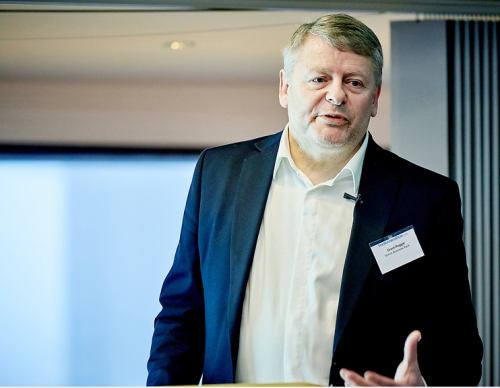What’s next for the Northern Powerhouse Investment Fund?

The Northern Powerhouse Investment Fund has to date made a considerable – £838m – impact on businesses across the North, with £334m directly invested, and a further £504m attracted in private sector co-investment. With the Tees Valley included in the collection of areas it covers, which stretches from East to West. Grant Peggie, director at the British Business Bank caught up with TheBusinessDesk.com about the fund’s future plans.
“We’re really pleased that the Tees Valley chose to come into the Northern Powerhouse Investment Fund and that they can see the benefits of joining in with the work we’ve been doing to date.”
He explained the decision he hopes has been vindicated by the work NPIF has been doing actively in the region through its work with both businesses and the combined authority.
“Ben Houchen’s support as the Tees Valley mayor has been fantastic and he’s done a lot of work to promote the fund and also provided us with some challenge when he thinks we’re not doing enough and that’s good for our relationship. I believe that we’ve been able to show him and others that the fund is for all parts of the North not just Leeds and Manchester and that as businesses in Tees Valley or Cumbria or Hull are seeking growth finance we’re ready to support them.”
Peggie noted that 68% of NPIF investment has actually gone outside of Liverpool, Manchester, Leeds and Sheffield, which shows that there is a lot of money “which is finding good investment opportunities” outside of those core cities.
The strength of NPIF’s approach for Peggie is the regional fund managers who are actually based in the region and focused on each of the regions the fund serves and will evaluate the business so as he puts it “it’s not just about money and we’re not just the computer says yes, it’s about the support we can offer the management and the business beyond just the funding.”
“The other thing we’re proud of is that it’s not just advanced manufacturing businesses which we’re supporting in the Tees Valley, we’re supporting businesses the length and breadth of the area’s economy from interesting digital businesses to net zero tech, life science and healthcare businesses which we’ve been able to support.”
Some of those businesses NPIF has already backed include SockMonkey Studios – a video game developer based in Middlesbrough who were backed by a quarter of a million pound investment by NPIF to fund the launch the its first original game; and Nova Pangea Technologies which is Wilton-based and received a £2.3m investment following a funding round led by NPIF which will allow the business to commercialise its technology to create bio-fuel and chemicals from waste biomass..
Looking ahead the strength of NPIF’s sector agnosticism means that Peggie is always looking at what trends are emerging.
He explained: “Life sciences and healthcare, we’ve known there are hubs around Manchester and Leeds but I think what we’re seeing now is actually other parts of the north are also strong. In fact, the sector has seen our first listing with Abingdon Health, located just outside York going public in December 2020.
“Clearly the pandemic has pushed life sciences and med tech up the agenda and I think that’s really interesting. But it’s also fascinating to see how advanced manufacturing is developing and we move away from traditional methods to new processes, and that links to net zero and how businesses are finding new and more efficient ways to work. This will continue to evolve.
“When we sat down in 2015/16 and launched NPIF, we didn’t really know what was going to happen to the economy, we couldn’t predict a pandemic, we didn’t know what Brexit could/would look like and the situation in the Ukraine and the current supply chain crisis wasn’t on the agenda. However, through all of those economic turbulence we’re delighted that we’ve been able to flex the fund and respond to some of those challenges.
“Certainly during the pandemic we were able to provide debt backed by CBILS to those companies who couldn’t get it from their bank and that in itself has been an interesting journey for us as we’ve been able to help really good quality businesses across the north.”
The impact of the pandemic on the British Business Bank’s – which manages NPIF – exposure to businesses has been significant. Pre-Covid the bank was working with 80,000 small businesses across the UK and now it has 1.6m small businesses in its portfolio, while the amount under management has gone from £7bn to £88bn over the same period.
“But what’s important is that we’re now working with businesses, who perhaps before Covid-19 forced them to think about it, would have said finance wasn’t for them. Thanks to the support they’ve received they’re now looking again at what their growth options are and what support perhaps we can offer through our fund managers.”
Looking ahead Peggie says the next iteration of the fund – provisionally known as ‘NPIF 2’ – “needs to be ready and operational by December 2023” which is when the current NPIF will finish investing as the bank “doesn’t want a hiatus or for businesses to be struggling for finance.”
“We’ve set ourselves that deadline so there’s a seamless transition, with businesses able to get investment from the new fund from say January 2024. That gives us 18 months to get it up and running so we’re building the analysis and evidence base now, building on what worked and didn’t in the first NPIF and speaking to combined authorities and LEPs as part of that.”
What will NPIF 2 look like, well Peggie relates back to the evolution of the current fund and its ability to be agile and respond to unforeseen challenges.
“Obviously none of us have a crystal ball so we need the fund to be flexible and agile and be able to respond to whatever’s happening in the economy and how that’s impacting businesses.
“Now we’ve left the EU there will be some changes to the rules, such as previously we couldn’t support FinTechs directly or businesses in the nuclear supply chain, so now that’s fallen away we need to take advantage of these freedoms to make sure we support those businesses in those sectors that can be really important to the future economy.
“I think the key thing is we’ve proven the model and the importance of having a physical presence in the areas we operate works – and there were doubters at the start. In fact, we’ve already exported the concept to the midlands via the Midlands Engine Investment Fund and we are now looking to do similar things in Scotland and the South West.
“As for NPIF 2 we now have the opportunity to push forward and support businesses and deliver more positive outcomes by supporting innovation, jobs creation, skills development and ultimate the regional economies and UK plc!”








